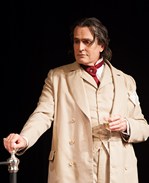SITE GUIDE
SEARCH
REVIEWS
REVIEW ARCHIVES
ADVERTISING AT CURTAINUP
FEATURES
NEWS
Etcetera and
Short Term Listings
LISTINGS
Broadway
Off-Broadway
NYC Restaurants
BOOKS and CDs
OTHER PLACES
Berkshires
London
California
New Jersey
DC
Connecticut
Philadelphia
Elsewhere
QUOTES
TKTS
PLAYWRIGHTS' ALBUMS
LETTERS TO EDITOR
FILM
LINKS
MISCELLANEOUS
Free Updates
Masthead
Writing for Us
A CurtainUp  London Review
London Review
 London Review
London ReviewThe Judas Kiss
|
We were raised like dogs, with no sense of social responsibility. It was damaging.
— Oliver
|

|
This is the performance of Rupert Everett’s lifetime. His Wilde is heavy and fatalistic but attractive for his clever wit. In both acts Wilde is in the companionship of Lord Alfred Douglas, or Bosie (Freddie Fox), once before the trial when Wilde had the opportunity to flee to France in the face of his impending arrest and later after his release from prison, when he and Bosie are in Italy. Everett has changed his physical appearance to look like Wilde and what we see is a great talent in love with a pretty but worthless creature. It isn’t that Wilde doesn’t appreciate the shortcomings of his young friend but he is powerless to alter his own feelings. When urged to escape by his wife Constance and his friend Robert Ross (Cal MacAninch), Wilde seems to listen to Bosie and stays.
This situation is all the more poignant for us because we know how Wilde died of bacterial meningitis before his time and what great works might he have written? In De Profundis only published in full in the 1960s, on reflecting on his time with Bosie, Wilde saw how he had neglected his work and wrote to him, “ I am not speaking in phrases of rhetorical exaggeration but in terms of absolute truth to actual fact when I remind you that during the whole time we were together I never wrote one single line. Whether at Torquay, Goring, London, Florence or elsewhere, my life, as long as you were by my side, was entirely sterile and uncreative.”
I consider that the depth of Everett’s moving performance is greater than Hare’s play, the first half of which is set in a naughty nineties tolerant London hotel and the second half abroad. Both scenes allow for lashings of sexual promiscuity. In Room 118 in the Cadogan Hotel a manservant is enjoying a maid in the guest’s bed and in Italy, Bosie and Galileo Masconi (Tom Colley), his handsome Italian man friend cavort naked while the older Wilde looks sadly on. On the back of the Ladies lavatory doors inside the theatre was this notice, “This Production contains Scenes of an Adult Nature and Nudity Throughout”. Is that a disclaimer? Are those who might be offended meant to leave at this point? Will the Box Office refund the price of tickets to those who booked unaware of the carnal content?
The weakness of Hare’s play seems to be the condemnation of Alfred Lord Douglas as a spoilt child, insensitive to Wilde’s feelings. “My suffering has been the greater,” says Bosie to Wilde. “All I cared for was beauty,” says Wilde. Freddie Fox’s Lord Alfred isn’t beautiful, just younger but I am disinclined to totally blame Lord Alfred for Wilde’s misfortunes. We maybe need to see some of what Wilde cared for.
The sets contrast the draped and swagged Victorian hotel with the simplicity of the house in Naples, a draped hanging curtain dominating first in red and then in blue. Australian director Neil Armfield stages the play very well and Rick Fisher’s lighting starts the play in a beautifully lit “in flagrante” scene and later enhances the feel of Neapolitan sunshine which intensifies, as Wilde talks about the Italian sun. This juxtaposes with remembrances as to how he wept every night for a year in prison. In the final scene dark shadows dominate as Bosie moves on and betrays Oscar.
For Elyse Sommer’s review of this play in New York in 1998 go here go here.
|
Subscribe to our FREE email updates with a note from editor Elyse Sommer about additions to the website -- with main page hot links to the latest features posted at our numerous locations. To subscribe,
E-mail: esommer@curtainup.comesommer@curtainup.com
put SUBSCRIBE CURTAINUP EMAIL UPDATE in the subject line and your full name and email address in the body of the message -- if you can spare a minute, tell us how you came to CurtainUp and from what part of the country. |
| The Judas Kiss
Written by David Hare Directed by Neil Armfield Starring: Rupert Everett, Freddie Fox With Ben Hardy, Kirsty Oswald, Alister Cameron, Cal MacAninch, Tom Colley Designed by Dale Ferguson Costume Designer: Sue Blane Composer: Alan John Lighting: Rick Fisher Sound: Paul Groothuis Running time: Two hours 30 minutes with one interval Box Office: 0844 871 7615 Booking to 6th April 2013 Reviewed by Lizzie Loveridge based on 22nd January 2013 at the Duke of York’s Theatre, St Martin's Lane, London WC2N 4BG (Tube: Charing Cross/Leicester Square) |
|
REVIEW FEEDBACK Highlight one of the responses below and click "copy" or"CTRL+C"
Paste the highlighted text into the subject line (CTRL+ V): Feel free to add detailed comments in the body of the email . . . also the names and emails of any friends to whom you'd like us to forward a copy of this review. |




